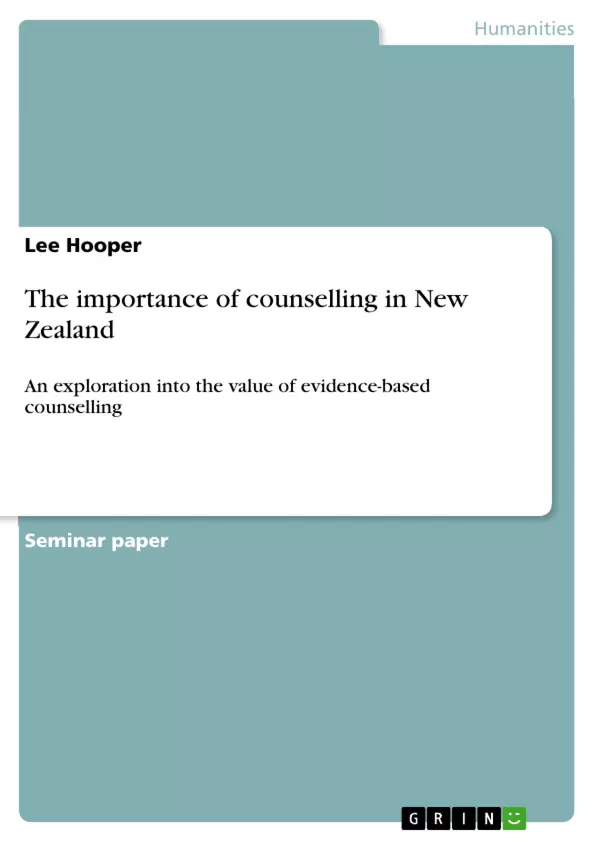As counselling often deals with those who are vulnerable it has been characterised as a high risk professional, and as such, controversy has often surrounded the effectiveness of its methodologies (Vacc, Devaney & Brendel, 2003). Because of the wide range of theoretical and practical approaches existing in the field, there is an ever-present need to critically analyse counselling’s role in society, in conjunction with the evidence to support it. This essay will explore the scientific evidence surrounding counselling in New Zealand and analyse the significance, in terms of efficiency and effectiveness, that counselling has on individuals at the psychological and emotional level. This will be done by first giving a definition of counselling alongside pointing out the differences that make it distinct from other helping professions. Second, the nature and purpose of counselling will be outlined, alongside its intention and the prerequisites needed to facilitate interpersonal connection. Last, the value of counselling will be demonstrated by giving an analysis of the issues facing validation and then illustrating studies at both the international and national level to demonstrate clinical efficiency. It is concluded that the link between evidence-based research and counselling is one that requires stronger emphasis and through developing more counselling orientated research projects, a greater value will able to be placed on the role of counselling role within New Zealand culture.
Table of Contents
- The Importance of Counselling in New Zealand: An Exploration into the Value of Evidence-Based Counselling
- Defining and Distinguishing Counselling
- The Nature and Purpose of Counselling
- The Value of Counselling in New Zealand
Objectives and Key Themes
This essay explores the value of evidence-based counselling in New Zealand. It aims to demonstrate the significance and effectiveness of counselling in addressing psychological and emotional issues. The essay defines counselling, distinguishes it from other helping professions, and outlines its nature, purpose, and prerequisites for successful interpersonal connection.
- Definition and differentiation of counselling from other helping professions
- The nature and purpose of counselling, emphasizing its intention and required prerequisites for interpersonal connection
- The value of counselling in New Zealand, including an analysis of validation issues and evidence-based research studies
- The need for stronger emphasis on the link between evidence-based research and counselling practice in New Zealand
- The importance of developing more counselling-oriented research projects to enhance the role of counselling within New Zealand culture
Chapter Summaries
- The essay begins by defining counselling as a collaborative relationship where individuals seek therapeutic outcomes through open, confidential, and non-judgmental communication. It distinguishes counselling from other helping professions, highlighting the counsellor's unique role as a dedicated therapist.
- The second section delves into the nature and purpose of counselling, emphasizing its goal of addressing psychological issues and facilitating positive change. It outlines the importance of cultivating specific psychological and emotional conditions within the counsellor to foster genuine connection with clients.
- The third section analyzes the value of counselling in New Zealand, highlighting the increasing demand for this service. It explores the need for evidence-based studies to support nationally funded counselling initiatives, emphasizing the importance of rigorous professional standards for counsellors.
Keywords
This essay focuses on evidence-based counselling, its value in New Zealand, and the need for stronger research to support its practice. Key terms include counselling, evidence-based research, psychological issues, interpersonal connection, professional standards, and the role of counselling within New Zealand culture.
Frequently Asked Questions
Why is evidence-based research important for counselling in New Zealand?
Evidence-based research is crucial for validating the effectiveness of methodologies and securing national funding for counselling initiatives.
How is counselling distinguished from other helping professions?
Counselling is a dedicated therapeutic relationship focused on emotional and psychological outcomes through open, confidential, and non-judgmental communication.
What are the prerequisites for a successful interpersonal connection in therapy?
Successful connection requires specific psychological conditions in the counsellor, such as empathy, genuineness, and the ability to foster a safe environment.
What is the current state of the counselling role in New Zealand culture?
There is an increasing demand for services, but the link between research and practice needs to be strengthened to enhance the profession's value.
What are the issues facing validation in the counselling field?
The wide range of theoretical and practical approaches makes it difficult to standardize clinical efficiency, requiring more targeted research projects.
- Quote paper
- Lee Hooper (Author), 2013, The importance of counselling in New Zealand, Munich, GRIN Verlag, https://www.grin.com/document/233137



